success
What is success to you? How to be successful in life?
To some, when they think of success, they imagine wealth; others want power; some just want to make a positive impact on the world.
All of these are perfectly valid, indeed success is a concept that means different things to different people. Though no matter what success is to you, it almost certainly isn’t something will come easily.
There are countless guides and books to being successful, however, as success is personal and unique to each individual. The advice contained in these books can often not be relevant. Therefore following the advice of a single individual can often be unhelpful.
With this in mind, considering the advice of a great many people, people whose ideas of success were different both to each other, and quite possibly, to you can be a good alternative.
SUCCESS :
S :- Set your goal.
U:- Understand the difficulty.
C:- Create a attitude.
C:- Clear all your doubts.
E:- Expect & accept the challenges.
S:- Stay on track.
S:-Smile on face.
How to Set Goals In Life

It’s a great time to consider where you are going and where you’d like to be. You probably know that goals are essential to being successful in life, but maybe you’re not sure where to start. Well, you’re at the right place – we’ve put together some great tips for you on how to set goals in life.
Often when someone says they have a goal, what they really mean is that they are attracted to a vague idea. You may say, “I just want to be happy.” But as Eleanor Roosevelt said, “Happiness is not a goal…it’s a by-product of a life well lived.” A life well lived rarely happens by accident. It is the result of setting and pursuing goals.
All successful people have a goal. No one can get anywhere unless he knows where he wants to go and what he wants to be or do.”
We’ve put together some questions to help you figure out a life that will bring you meaning and a sense of accomplishment. We’ll help you figure out what to write down in that fancy planner.
Dreams and Goals
Great goals start with daydreams, imaginations, and hopes. The worries, struggles, and busyness of life can easily become barriers to dreaming. Setting good goals starts with taking time to dream. Let go of what others say you or people like you “should”or “can’t” be or do. This is dreamland – there are no limits.
Listen to any subconscious objections and actively choose to set them aside – just for now. Describe your ideal life. Write down whatever comes to mind, even sketch it if that’s more helpful to you. You may find this post on How to Create the Life You Want from the Broken Blessings additionally helpful. After you’ve done this, answer the questions that follow to help you refine your vision.
If you want to be happy, set a goal that commands your thoughts, liberates your energy, and inspires your hopes.”
Top 3 Goals
We’ve put together three guidepost questions. Knowing the answers to these above can help you re-adjust the details other goals in your life to keep you moving towards your dream life. These essentially become your top three goals – the goals to which all other goals move your towards.
- How do you want to feel?
- What do you want to experience?
- If the world only gets one message from your life, what do you want it to be?
Make sure you know these, because there will be factors in your life you can’t control.
Goal Example
Let’s say you’ve determined that being a professional basketball player is your life’s goal. Then one day, you blow your knee out. Career over, dreams crushed. What now? In light of the questions above, consider why you wanted to be a pro basketball player. Know your why.
- Is it for the pay?
- Is it because you like being part of a team?
- Do you like to spend most of your days doing something athletic?
- Did you hope for fame?
- Would it make you feel accomplished?
There are other ways to do all of the above. Even if you didn’t blow out your knee, knowing the answers to the guidepost questions can help you navigate your career.
After you have defined your top three goals, it may be easier to get into the nitty gritty of defining or setting more detailed goals. All of the more detailed goals should move you towards your top three goals in some way.
Creating A Life Plan Worksheet
We’ve put together a worksheet with the questions listed below to help you define your ideal life in greater detail. We recommend you respond to each question with as much detail that if you were to read it 5 or 10 years from now you’d understand exactly what you described.
- What are the different relationships you’d like to have in your life?
- Which places you would like to visit?
- What kinds of friends do you want to have?
- Where do you want to live?
- What things do you want to buy?
- If you could win awards, what awards would you want to win?
- What does your spiritual life look like?
- How do you want to be intellectually?
- What kind of home do you want to own?
- How do you want to be emotionally?
- What qualities do you want to develop in yourself?
- How do you want to be physically?
- What hobbies do you want to pursue?
- Who do you want to help?
- What kinds of projects do you want to do?
- How do you want to think and feel about yourself?
- What are your goals educationally?
- What do you want to be a part of?
- How will you know when you have “arrived”?
- What are 10 adjectives that others might use to describe you, when you have reached your goals?
How to Plan Your Life Goals
Once you’ve written up your ideal life, you may want to take a break & see if anything else pops into your mind. Sometimes, once you stop trying to think about it, additional, but important details will pop up.
After a break or whenever you are ready, sit down and go through each of your answers & write down down what achievements are required to get you to this life. These achievements are your actionable goals. They are the actions that will take you from dreamer to achiever.
SMART Goals
If you want to improve your odds of success even further, make sure your goals stand up to the test of being SMART goals. SMART goals give a more specific direction and a more concrete reality to strive towards. Review your goals and re-write any that need it as SMART goals. SMART goals are Specific, Measurable, Achievable, Relevant, and Time-based.
The next important step is to define the path to break down your big goals into smaller steps. Take one big goal at a time and write down the steps or supporting action you need to take to get to that goal and write down every supporting action you can think to take you to closer to your big goal.
For instance, if you want to own a home, you’ll probably need to get a loan.
So “get a home loan” goes on your list of goals.
So “get a home loan” goes on your list of goals.
To get a loan, you’ll need a good credit history.
So “build a good credit history” goes on your list.
So “build a good credit history” goes on your list.
To build a good credit history you’ll need to get a credit card.
Add “get a credit card.”
Add “get a credit card.”
For that credit history to be good, you’ll need to pay your credit card bill on time.
Add “pay the credit card bill on time”
Add “pay the credit card bill on time”
To pay your credit card on time, you’ll need to make sure you “stay on top of the payment schedule”… and so on.
Setting Goals Worksheet
Figuring out the path for each piece of your dream life will result in a long master list of goals. We’ve put together this setting goals worksheet to help guide you through building your master list of goals.
Final Thoughts on How to Set Goals in Life
Yes, this work of writing up goals takes time and effort, but it’s worth it. You can charge ahead in life with what you feel is the right direction, but speed and effort without direction can only guarantee you exhaustion.
The trouble with not having a goal is that you can spend your life running up and down the field and never score.”
Set SMART Goals
You have probably heard of SMART goals already. But do you always apply the rule? The simple fact is that for goals to be powerful, they should be designed to be SMART. There are many variations of what SMART stands for, but the essence is this – goals should be:
- Specific.
- Measurable.
- Attainable.
- Relevant.
- Time Bound.
Set Specific Goals
Your goal must be clear and well defined. Vague or generalized goals are unhelpful because they don't provide sufficient direction. Remember, you need goals to show you the way. Make it as easy as you can to get where you want to go by defining precisely where you want to end up.
Set Measurable Goals
Include precise amounts, dates, and so on in your goals so you can measure your degree of success. If your goal is simply defined as "To reduce expenses" how will you know when you have been successful? In one month's time if you have a 1 percent reduction or in two years' time when you have a 10 percent reduction? Without a way to measure your success you miss out on the celebration that comes with knowing you have actually achieved something.
Set Attainable Goals
Make sure that it's possible to achieve the goals you set. If you set a goal that you have no hope of achieving, you will only demoralize yourself and erode your confidence.
However, resist the urge to set goals that are too easy. Accomplishing a goal that you didn't have to work hard for can be anticlimactic at best, and can also make you fear setting future goals that carry a risk of non-achievement. By setting realistic yet challenging goals, you hit the balance you need. These are the types of goals that require you to "raise the bar" and they bring the greatest personal satisfaction.
Set Relevant Goals
Goals should be relevant to the direction you want your life and career to take. By keeping goals aligned with this, you'll develop the focus you need to get ahead and do what you want. Set widely scattered and inconsistent goals, and you'll fritter your time – and your life – away.
Set Time-Bound Goals
Your goals must have a deadline. Again, this means that you know when you can celebrate success. When you are working on a deadline, your sense of urgency increases and achievement will come that much quicker.
3. Set Goals in Writing
The physical act of writing down a goal makes it real and tangible. You have no excuse for forgetting about it. As you write, use the word "will" instead of "would like to" or "might." For example, "I will reduce my operating expenses by 10 percent this year," not "I would like to reduce my operating expenses by 10 percent this year." The first goal statement has power and you can "see" yourself reducing expenses, the second lacks passion and gives you an excuse if you get sidetracked.
Post your goals in visible places to remind yourself every day of what it is you intend to do. Put them on your walls, desk, computer monitor, bathroom mirror or refrigerator as a constant reminder.
4. Make an Action Plan
This step is often missed in the process of goal setting. You get so focused on the outcome that you forget to plan all of the steps that are needed along the way. By writing out the individual steps, and then crossing each one off as you complete it, you'll realize that you are making progress towards your ultimate goal. This is especially important if your goal is big and demanding, or long-term. Read our article on Action Plans for more on how to do this.
5. Stick With It!
Remember, goal setting is an ongoing activity, not just a means to an end. Build in reminders to keep yourself on track, and make regular time-slots available to review your goals. Your end destination may remain quite similar over the long term, but the action plan you set for yourself along the way can change significantly. Make sure the relevance, value, and necessity remain high.
Key Points
Goal setting is much more than simply saying you want something to happen. Unless you clearly define exactly what you want and understand why you want it the first place, your odds of success are considerably reduced. By following the Five Golden Rules of Goal Setting you can set goals with confidence and enjoy the satisfaction that comes along with knowing you achieved what you set out to do.
So, what will you decide to accomplish today?
Set your goals and make them happen
Goals big and small can be the stepping-stones to a happier life and the way we set them can make a difference to achieving them. Here's how.
WHY TO DO ?
Having goals for things we want to do and working towards them is an important part of being human. The path towards our goals may not always run smoothly or be easy, but having goals, whether big or small, is part of what makes life good. It gives us a sense of meaning and purpose, points us in the direction we want to go and gets us interested and engaged, all of which are good for our overall happiness.
Over 2000 years ago, Aristotle said "Well begun is half done." And with regards to goals, he's right (as he seems to have been on a lot of things). Paying attention to how we set our goals makes us more like to achieve them and achieving them makes us feel good about ourselves and our lives.
WHAT TO DO ?
- Decide. Think of something you want to do or work towards. It doesn't matter what, as long as it's something you want to do - ideally something you're interested in or feel excited by. It should be something you want to do for its own sake not for something or someone else. It can be a big thing or a small thing - sometimes it is easier to get going with something small. And it often helps if it's something that's just a little bit beyond what you currently can do - goals that stretch us can be motivating!
- Write it down. Carefully. Writing down our goals increases our chances of sticking with them. Write down how you will know you have reached your goals and when you'd like to have achieved it by. Ask yourself: what it will 'look' like and how will you feel when you've done it? How does it connect to who or what you value in your life? Describe your goal in specific terms and timescales e.g. 'I want to plant lettuces, carrots and peas in the empty patch in my garden by the end of May' rather than 'I want to do some gardening.' Write your goals in terms of what you want, not what you don't want. For example: 'I want to be able to wear my favourite jeans again', rather than 'I don't want to be over-weight anymore'.
- Tell someone. Telling someone we know about our goals also seems to increase the likelihood that we will stick at them.
- Break your goal down. This is especially important for big goals. Think about the smaller goals that are steps on the way to achieving your bigger aim. Sometimes our big goals are a bit vague, like 'I want to be healthier'. Breaking these down helps us be more specific. So a smaller goal might be 'go running regularly' or even 'to be able to run around the park in 20 minutes without stopping'. Write down your smaller goals and try to set some dates to do these by too. Having several smaller goals makes each of them a bit easier and gives us a feeling of success along the way, which also makes it more likely that we'll stay on track towards our bigger goal.
- Plan your first step. An ancient Chinese proverb says that the journey of 1000 miles starts with one step. Even if your goal isn't to walk 1000 miles, thinking about the first step on the way will really help to get you started. Even if you don't know where to start there's no excuse - your first step could be to research 'how to…' on the internet or think of people you could ask or to get a book on the subject from the library. Then think of your next step…and the next…
- Keep going. Working towards our goals can sometimes be difficult and frustrating - so we need to persevere. If a step you're doing isn't working, think of something else you could try that still moves you forward, even a tiny bit. If you're struggling, ask people you know for their ideas on what you could do. They may help you see a different way. Thinking about different ways of reaching our goals makes it more likely we'll be successful. If you're really struck - take a break and then re-read the goal you wrote down when you started. If you need to adjust your goal - that's ok too. Then have another think about a small next step…
- Celebrate. When you reach your goal take time to enjoy it and thank those that helped you. Think about what you enjoyed and learned along the way. Now, what is your next goal or project going to be?
Understanding the difficulties
Understanding what is said to us involves a range of different skills. We have included some of these skills below.
A young person may have difficulty in one or more of these areas. This will affect how well they understand what other people are saying.
Listening and attention
Paying attention and listening to other people can be difficult for some children. They may be easily distracted.
Auditory skills
We need to tell the difference between different sounds. This is known as ‘auditory processing’. We also need an effective memory for sounds and words. This is known as ‘auditory memory’.
Some children may find it difficult to remember enough words or sounds to make sense of what they are hearing.
Understanding words and concepts (semantics)
We need to understand the words a speaker is using. Some children find it difficult to learn and remember new words.
We also need to understand the meaning of a word or the ideas behind it. Some children find it difficult to understand abstract concepts. For example, words to do with size or time.
Understanding sentences
We need to understand the way sentences are constructed. This is often called ‘grammar’ or ‘syntax’.
We also need to understand how different word endings can change the meaning of a sentence. For example 'I pour' becomes 'I poured' if it has already happened.
Some children find it hard to understand sentences with lots of information or with complex structures.
Memory
When learning new words, children rely on their memory. This is because they need to compare new words to words they have already learnt. If a child has difficulty doing this, they will struggle to understand what is being said.
Create a attitude :
A positive attitude--optimism, expectancy, and enthusiasm--makes everything in business easier. A positive attitude boosts you up when you're down and supercharges you when you're already "on a roll."
Here's how to cultivate a positive attitude, regardless of what's happening at work, based upon a conversation with Jeff Keller, author of the bestseller Attitude Is Everything:
1. Remember that YOU control your attitude.
Attitude does not emerge from what happens to you, but instead from how you decide to interpret what happens to you.
Take, for example, receiving the unexpected gift of an old automobile. One person might think: "It's a piece of junk!" a second might think: "It's cheap transportation," and a third might think: "It's a real classic!"
In each case, the person is deciding how to interpret the event and therefore controlling how he or she feels about it (i.e. attitude).
2. Adopt beliefs that frame events in a positive way.
Your beliefs and rules about life and work determine how you interpret events and therefore your attitude. Decide to adopt "strong" beliefs that create a good attitude rather than beliefs that create a bad attitude. To use sales as an example:
- Situation: The first sales call of the day goes poorly.
- Weak: A lousy first call means that I'm off my game and today will suck.
- Strong: Every sales call is different, so the next will probably be better.
- Situation: A customer reduces the amount of an order at the last minute!
- Weak: Customers who change orders can't be trusted.
- Strong: Customers who change orders are more likely to be satisfied!
- Situation: A big sales win comes seemingly "out of nowhere."
- Weak: Even a blind pig finds an acorn once in a while.
- Strong: You never know when something wonderful will happen!
3. Create a "library" of positive thoughts.
Spend at least 15 minutes every morning to read, view, or listen to something inspirational or motivational. If you do this regularly, you'll have those thoughts and feelings ready at hand (or rather, ready to mind) when events don't go exactly the way you'd prefer.
4. Avoid angry or negative media.
Unfortunately, the media is full of hateful people who make money by goading listeners to be paranoid, unhappy, and frightened. The resulting flood of negativity doesn't just destroy your ability to maintain a positive attitude; it actively inserts you into a state of misery, pique, and umbrage. Rather than suck up the spew, limit your "informational" media consumption to business and industry news.
5. Ignore whiners and complainers.
Whiners and complainers see the world through crap-colored glasses. They'd rather talk about what's irreparably wrong, rather than make things better. More importantly, complainers can't bear to see somebody else happy and satisfied.
If you tell a complainer about a success that you've experienced, they'll congratulate them, but their words ring hollow. You can sense they'd just as soon you told them about what's making you miserable. What a drag (figuratively and literally)!
6. Use a more positive vocabulary.
I've written about this before, but the point is worth making again. The words that come out of your mouth aren't just a reflection of what's in your brain--they're programming your brain how to think. Therefore, if you want to have a positive attitude, your vocabulary must be consistently positive. Therefore:
- Stop using negative phrases such as "I can't," "It's impossible," or "This won't work." These statements program you for negative results.
- Whenever anyone asks "How are you?" rather than "Hangin' in there," or "Okay, I guess..." respond with "Terrific!" or "Never felt better!" And mean it.
- When you're feeling angry or upset, substitute neutral words for emotionally loaded ones. Rather than saying "I'm enraged!" say "I'm a bit annoyed..."
8 Ways to Improve Your Attitude
A positive attitude make success easy; a negative one makes success pointless.

If you truly want to be successful, your number one task should be to create and maintain a positive attitude. When you've got an attitude of optimism, expectancy and enthusiasm, opportunities grow, and problems shrink.
If you're a leader, a positive attitude draws people to your side and encourages them to do their best work. A leader with a negative attitude, however, can only compel others to take action through fear.
More importantly, what would be point of being successful if you're always feeling lousy? With that in mind, here's how to ensure your attitude stays upbeat:
1. Always act with a purpose.
Before you take any action, decide how it will serve your greater goals. If the connection is weak or non-existent, take that action off your to-do list. Aimless activity wastes time and energy.
2. Stretch yourself past your limits every day.
Doing the same-old, same-old is depressing, even if your same-old has been successful in the past. Success is like athletics; if you don't stretch yourself every day, you gradually become slow and brittle.
3. Take action without expecting results.
While you naturally must make decisions and take action based upon the results you'd like to achieve, it's a big mistake to expect those results and then be disappointed when you don't get them. Take your best shot but don't obsess about the target.
4. Use setbacks to improve your skills.
Rather than feeling bad if you fail or get rejected, look back at your actions and see what you can do (if anything) to improve your performances. Remember: the results you receive are the signposts for the results you want to achieve.
5. Seek out those who share your positive attitude.
It's a scientific fact your brain automatically imitates the behaviors of the people around you. (It's because of something called a mirror neuron). Therefore, you should surround yourself with positive thinkers and shun those who are excessively negative.
6. Don't take yourself so seriously.
If you want to be happier and make those around you feel more comfortable, cultivate the ability to laugh at yourself. If you don't (or can't) laugh at yourself, I guarantee you that the people you work with are laughing behind your back!
7. Forgive the limitations of others.
High standards are important, but humans are, well, human. It's crazy to make yourself miserable because other people can't do a job as well as you think you could, or when people don't share your vision with the same passion that you feel.
8. Say "thank you" more frequently.
Achieving an "attitude of gratitude" requires more than simply being aware of what's wonderful in your life. You must, and should, thank other people for their gifts to you, even if that gift is something as simple as a smile.
CLEAR ALL YOUR DOUBTS:
CLEAR ALL YOUR DOUBTS:
"Don't waste life in doubts and fears; spend yourself on the work before you, well assured that the right performance of this hour's duties will be the best preparation for the hours and ages that will follow it."
Expect & Accept your challenges:
How to Face a Challenge With Confidence
Life is full of challenges. Some people seem to meet every challenge with confidence, while others struggle to overcome them. Learn how to turn your challenges into opportunities for growth

Life is full of challenges. Some people seem to meet every challenge with confidence, while others struggle to overcome them. Pittas especially get a sense of satisfaction from facing challenges head on—it brings a sense of accomplishment and can be very fulfilling. On some level, you actually seek challenges. Your highest self wants you to learn and grow, and life’s most effective tool toward growth is experience.
The problem is that all too often you might find yourself faced with the same challenges over and over again, and that’s when you start to lose motivation to face the issue and you lose sight of the potential lesson. At that point, challenges can become problems that can spiral you into despair and frustration.
As a co-creator of your own reality, you have the ability to overcome these challenges. It is with this sense of responsibility and awareness that you can begin your journey into a higher state of consciousness where challenges are no longer challenges, but opportunities to get a glimpse of your highest self.
Here are some ways to better accept and meet your personal challenges, whatever they may be.
Face the Challenge
In many cases this is the most important step, the most obvious step, yet it is also the most often missed. People spend time looking for a way around the issue, or wallowing in despair at the enormity of the challenge, instead of facing it. Even mundane things, like a pileup of laundry or work, get ignored. Putting a challenge off doesn’t make it go away. This is true of big challenges, as well as the small ones. The most important thing you can do is face what’s in front of you head on.
Be Present
Do not underestimate the power of being present. If you make a practice of facing your challenges—even in failure—with full presence and awareness, you will find most challenges are not challenges at all. Instead life’s challenges become messages from the universe. Meditation can help you cultivate silent awareness and is a good tool to help bring that focus to yourself during difficult times.
You can ask yourself questions that help you better understand the problem and how it affects you.
- Why is this a challenge?
- Do I believe that I am capable of being successful at this challenge?
- What are the possible outcomes if I succeed?
- What is the outcome if I fail?
These questions are not meant to solve the problem, rather they are meant to help bring you into fuller awareness of the challenge itself and your emotional reaction to it.
Look to Your SELF for the Solution
Others can help you arrive at your own understanding, but no one ever solves your problems for you. Even in circumstances where someone else is acting as an authority or partner, only you can decide for yourself how you will process the situation. The longer you spend searching for guidance outside of yourself, the longer you spend ignoring the problem. Even those who appear to help are only acting as instruments in the greater process of love and grace that is the true nature of your relationship to the universe.
Stop looking for the easy way out or the wise words that will show you the way. Assess the situation, your resources, and your abilities, and then act. Your action may include enlisting help from others, but it will be your challenge to solve. The sooner you take up the challenge, the quicker it stops being a problem.
Know Yourself
There is a reason why certain challenges seem hard to you while others breeze right through the same situations. There’s a reason why you put off a task for weeks that can be done several times a day by someone else. It’s not because they have anything over you or are better than you. And it has nothing to do with a particular skill set or know-how. It’s all about consciousness. Those who face challenging tasks have found a way to avoid seeing those activities as challenges.
Challenges are opportunities to grow. That growth takes place out of potentiality, your potentiality, which is infinite and highly active in every moment of life. Come to know yourself as that. You are pure potential experiencing life through what seems like limitation. Challenges are spikes in that imaginary limitation barrier that guide you to awareness.
You decide: Are you limited or are you an ever-expansive growth of consciousness and love? Choose the latter, and taking another look at that so-called challenge you’ve been facing. With your potential, you can turn a mountain of a challenge into a speck of dust—take that dreaded project and turn it into that thing you did before lunch today.
Detach From the Outcome
Stressing about the potential outcome is often what turns a molehill into a mountain. Once you shift your focus to the thing you’re actually doing, instead of the result, the most intimidating parts of the trial start to disappear.
When you attach emotions to the problem, it has power over you. If you simply perform the task at hand without worrying about the outcome, you have power over the situation.
Some challenges seem enormous and harsh, but if you remain centered and full of awareness, no challenge is too big to meet with power and grace.
10 Sentences You Should Tell Yourself When Facing Huge Challenges
“The brick walls are there for a reason. The brick walls are not there to keep us out. The brick walls are there to give us a chance to show how badly we want something. Because the brick walls are there to stop the people who don’t want it badly enough.” — Randy Pausch, The Last Lecture
Have you ever been faced with a challenge that seems like a brick wall that is too ridiculously high to climb over? In these moments we can often feel angry, scared, frustrated, alone and think to ourselves: “Why me?” “Why now?” “I can’t do that!” “There’s no way I can get past this!”
I totally get it. We all get it, because we’ve all been there. The thing is that there are plenty of people making it over to the other side, some of whose walls are even higher than yours. It might take them a while, they might have to get creative on how they do it, but they still make it over eventually and if they can, so can you.
Instead of filling your mind with thoughts that keep your feet glued to the ground, try telling yourself these 10 sentences and start climbing that wall one little step at a time. The grass is greener on the other side.
1. “I am stronger and more capable than I think I am.”
You have deep wells of strength that you don’t even know exist. Sometimes our brains try to hide these from us in an attempt to keep us safe and within our comfort zone, but you don’t have to believe everything you think. I promise you that you are physically, mentally and emotionally stronger than you think you are.
2. “I have faced and conquered many challenges in my life and I can do it again.”
Take a moment to think about a time in your life that was really hard. A huge challenge that you didn’t think you could get through but you did. You fought, you pushed through the fear and in the end you achieved the seemingly unachievable. You did it then and you can absolutely do it now.
3. “I know there is a valuable lesson to be learned from this, even if I don’t understand what it is right now.”
We are not meant to live in our comfort zone. If we did we would never do anything, we would never experience full lives or grow or evolve. Life gives us challenges to test us and push us further than we ever thought possible. Often we look back on past experiences and see why they happened or what we learned from them. There is something to learn from this one too, even if we don’t know what it is right now.
4. “I can find happiness in any situation.”
Your life will never be perfect. There is no moment in the future where everything will line up and you will be blissfully happy. “I’ll be happy when (fill in the blank).” That moment doesn’t exist. Happy people choose to be happy now by finding something to be grateful for in any situation. It can be as simple as your morning coffee that tastes so delicious. Think through and focus on the positives more than you do the negatives.
5. “I have made mistakes before but I am not my mistakes. I believe in my ability to change and be better.”
We all make mistakes, it’s a part of life. It’s also the way we learn and grow. You have no control over the things that have happened in the past, but you do have control over the decisions you make in the future. Choose to believe in your ability to make better decisions. Sure you might make a few more mistakes along the way, and who cares? Learn from them, grow from them and move on.
6. “I am calm and collected as I make my way through this.”
We think more clearly and have better judgment when our minds are calm. Take a few minutes to yourself. Breathe in and out slowly. Let any thoughts that come in float away (I actually picture mine as little butterflies floating into the sky) and say to yourself, “I am calm and collected as I make my way through this.”
7. “I trust myself in making great decisions.”
Sometimes challenges can leave us feeling torn and completely confused. Trust that deep down you know what the best answer or approach is. Whatever you choose and whatever happens will eventually work out and be OK. So take the pressure off yourself and trust in your intuition.
8. “I have the ability to solve problems creatively.”
You have the ability to think outside the box and get creative when it comes to solving your own problems. Trust in yourself and this creative power. If you’re doing something that’s not working, try a different approach. The worst thing that could happen is that it stays the same as it is now.
9. “I am not expected to do this alone. I can ask for help if I want it.”
Whatever the challenge is, you are not expected to do it alone. Reach out to people who love and support you or seek the assistance of healers, counselors, whomever and whatever you think will help you get through this. It’s amazing how simple our problems can seem when we start working through them with others.
10. “I choose to see this challenge as an opportunity.”
It can be hard to be positive in times of struggle, but a huge challenge is only one because we let it be. Force yourself to look for the opportunities you are being given because of this challenge. It could be that it has brought you closer to your family and friends, or that you have learned a valuable lesson. See your challenges as opportunities to grow and be better.
You can do this. You are strong enough.
“Every great story on the planet happened when someone decided not to give up but kept going no matter what.”
STAY ON TRACK:

How to Stay on Track
It’s a common scenario. You set a goal and get really amped up about reaching it. But, somewhere down the line, life happens, and you get blown off course. If this has happened to you, don’t worry. You can learn to stay on track by clarifying your goals, finding ways to stay accountable, and keeping yourself motivated.
Reaffirming Your Goals

Revisit your priorities. In order to make sure you stay on track towards goal-attainment, you have to verify that your goals align with your overall vision. You can do this by clarifying your personal values and comparing them to the goals you have set.
- For instance, you may find that your most important values are family, charity, and creativity. If you set a goal to get promoted at your job in six months’ time, this goal may conflict with your values of family and creativity.
- Take a look at your goals and see if they currently align with your personal values. Your main goals should work in conjunction with these values, not in competition.
- Look closely that the goals themselves, too. Are they genuine? Are they based on your aspirations and desires or, perhaps, on what you think other people or society expects? Revisit your reasoning and know why you are working towards your goals.

Focus on one goal at a time. If you’re striving towards several competing goals, it’s easy to get blown off course. Narrow your focus and improve your chances of success by working towards one major goal at a time. Then, break this goal down into smaller, more manageable segments that you can steadily work towards.
- For example, if you're trying to save money but also have a goal to travel, these goals might be difficult to do simultaneously. You may have to choose which one is most important to your right now.
- If you’re juggling several goals at once, you could try using a digital tracking app. An app like LifeTick, for instance, asks you to set specific, measurable, time-specific goals and then create steps required to reach those goals. It lets you stay focused and keep track of how far you’ve come – and how far is left to go.

Track your progress. Attainable goals all have one thing in common: you can measure your progress. If you haven’t been tracking your advancement towards the ultimate goal, how can you know when you get there? You can’t. That’s why you need to build clear measures into your goals.
- For instance, if you set the goal “save more money,” there is no clear indicator of what that means or when you get there. “Save more money” could translate to $5 or $5000. Set goals that you can easily track, such as “Save $5000 by 6:00pm on October 27th.”
- Again, digital tracking apps may help you monitor your progress. Some apps like LifeTick let you set goals and track your steps toward most any goal, while others can focus on specific goals. The Quitnow app, for example, specializes in helping people quit smoking

Learn from setbacks. Everyone encounters obstacles while trying to reach their goals. But, if you anticipate them, you can move past these obstacles more quickly. The trick is to not dwell on the problem, but immediately focus on a viable solution.
- When you encounter a setback, review the situation to determine what went wrong. Seek out feedback from others. Revise your plan in light of the new information you now have. Then, renew your commitment to the goal and keep going.
- For example, you ate unhealthy despite your new diet. If this happens, immediately return to the plan. Maybe it happened because you had not prepped your meals, so you can prevent it from reoccurring by always planning your meals ahead.
- The key is to not allow setbacks to cause you to feel like a failure and give up altogether. Use them, instead, to learn and motivate yourself.
Holding Yourself Accountable

Schedule it. Whatever your goal is, you can’t expect life to work around it. Whether you’re trying to save money, start a new career, or lose weight, you need to make your goal a top priority by carving out time for it every day. If your goal is a standing commitment in your schedule, you are more likely to stay on track.




- For instance, if you are trying to lose weight, you might include a 30-minute window for exercise in your daily calendar.

hare your goals with others. A natural source of accountability for goal-completion is your social circle. Setting a personal intention only goes so far. In addition, tell someone in your network about your intentions. Friends and family can remind you to stick with your goals. They may also offer encouragement when times get tough.

Reduce distractions. If you don’t have measures in place to control distractions, your goals are at the mercy of your environment. Social media, unexpected phone calls and visits, and smartphone notifications compete for your attention, and usually win.
- Work in an environment that supports productivity. Reduce clutter around your desk. Install applications that require that you complete a certain amount of work before using non-goal-oriented websites. Put your phone on silent. Hang up a “do not disturb” sign.
Maintaining Enthusiasm

Celebrate small successes. If you’re tackling a big goal, you may start to lose morale as time goes on. Before you know it, you are completely off track. Stay on track by setting natural milestones into your goals and celebrating when you pass them.

- For example, if you want to write a novel, you might set milestones for ten thousand words, twenty-five thousand words, and so on. When you reach each milestone, reward yourself.

Surround yourself with the right people. The people you spend the most time with have a significant impact on your journey to success. If you’re around the wrong people, they may distract you, expose you to temptations, or discourage your goals altogether. The right people, however, will push you to be your best self.
- Find these people by joining clubs and organizations dedicated to your goals. For instance, if you want to lose weight, you might participate in a local Weight Watchers support group or join the MyFitnessPal online community.

Keep your stress in check. If you are not actively managing stress in your life, you are setting yourself up for failure. Too much stress can affect your health and lead you to engage in self-sabotaging behaviors. When you have a stress management plan in place, you can keep stress in check so you stay on track with your goals. Try this:
- Get at least 7 to 9 hours of sleep each night.
- Exercise for at least 30 minutes each day.
- Eat real, unprocessed foods.
- Find a hobby that you enjoy.
- Practice relaxation exercises like deep breathing or meditation.
Enjoy life. What is the use of goals if you can’t enjoy the journey? Having goals and structure is important for personal and professional growth, but being goal-oriented can be unhealthy if taken to extremes. Make sure to leave time for fun and for others, like friends and family.
- Make time for others. Don’t forget to connect with loved ones – your friends and family – and nourish those important relationships. Call your parents. Go for coffee with your friends. See a movie with a group of loved ones.
- Have fun from time to time. Do something just for the pure fun and enjoyment of it. Taking breaks will help you recharge and be more focused and ready to pursue your goals.

What follows is a list of 13 of the best pieces of advice from some of the most successful people who have ever lived. If you want to learn how to be successful, these tips are essential:
1. Think Big
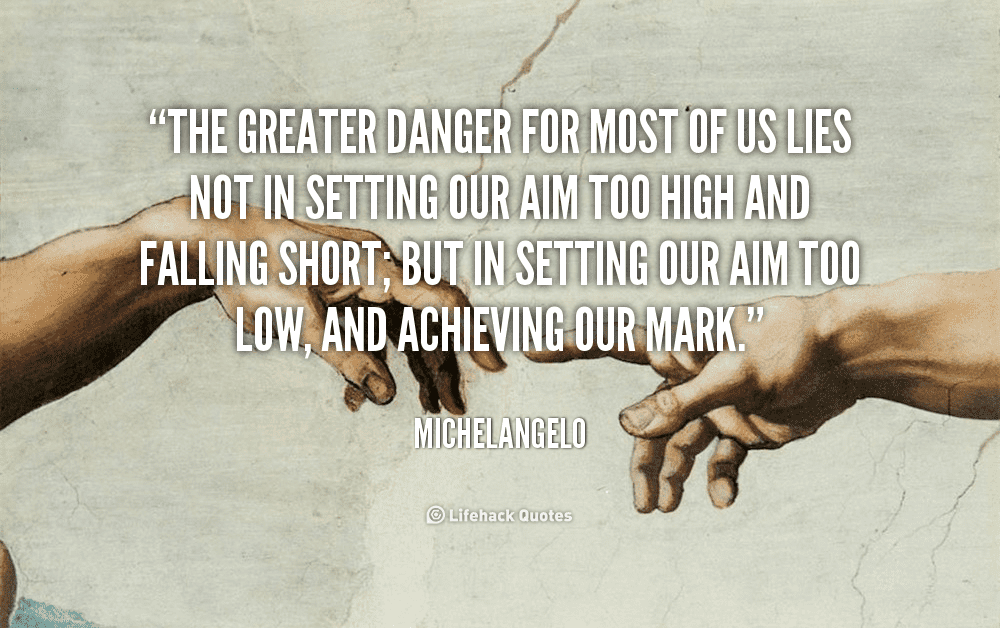
“The greater danger for most of us lies not in setting our aim too high and falling short; but in setting our aim too low, and achieving our mark.”
There are few artists as influential as Michaelangelo. Today centuries after his death, his work still inspires and connects to people. His work is world famous, just think of his statue of David, or the Mural in the Sistine Chapel in the Vatican.
Imagine then, if he decided not to work as an artist.
Being a successful artist has always been extremely difficult, imagine if he decided to give up this ambition in favour of something easier?
Oftentimes, people often decided to put their dreams aside for something more “realistic”. To give up their dream for something easier. This quote teaches us the danger of such a point of view.
Instead be ambitious.
Instead be ambitious.
2. Find What You Love to Do and Do It
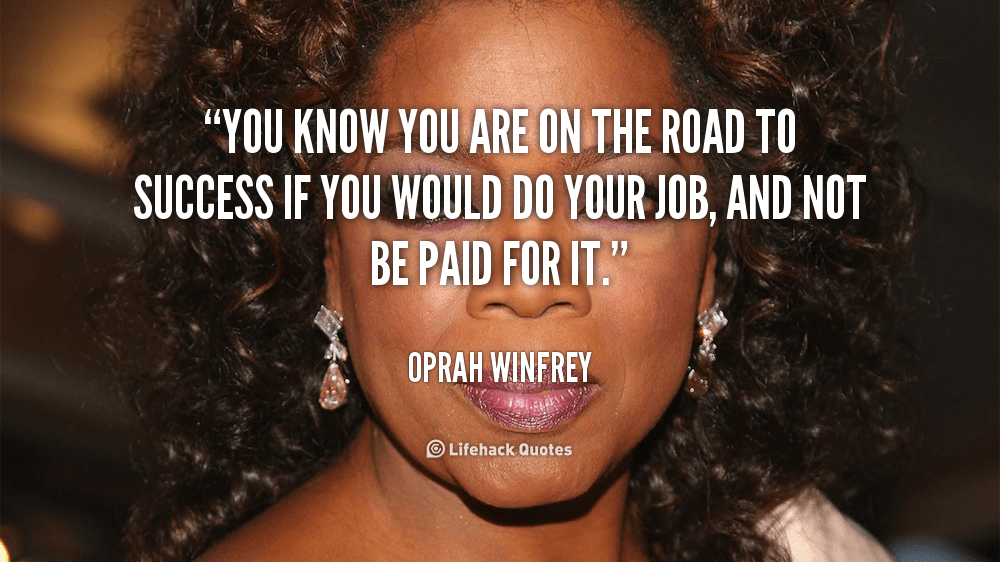
“You know you are on the road to success if you would do your job and not be paid for it.”
This is a good quote to remember and think about when you’re at work.
Imagine being as successful as possible in your current job. Ultimately you’ll probably find yourself working extremely hard and this it will take up much of your time.
If it’s a job you hate, then being successful at it might only mean filling your life with something you hate to do. What’s the sense in this?
Instead, why not focus on doing something you love? When you’ve found what you’re passionate about, you get the motivation to keep you moving. Success at this means the fulfilment of your dreams.
Not sure what your passion is yet? You should learn about this Motivation Engine first.
Even if you’re not successful, you still filled your time with something you love to do. Many successful musicians spent years of their lives doing unpaid performances, the only reason they kept playing was because they loved to perform.
3. Learn How to Balance Life
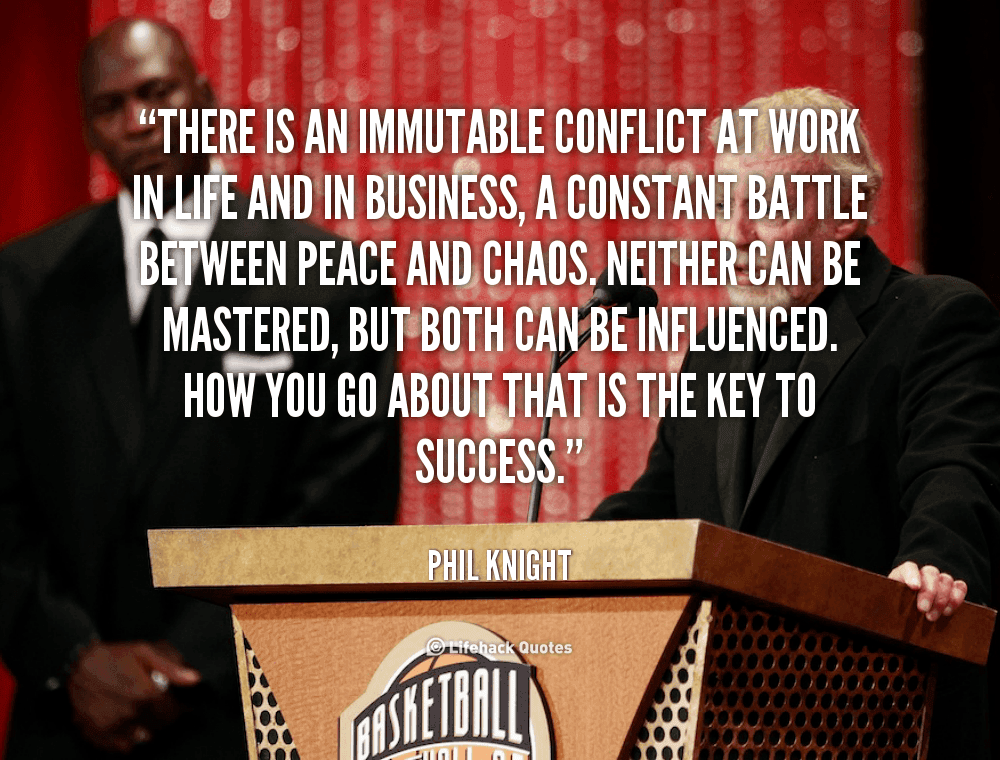
“There is an immutable conflict at work in life and in business, a constant battle between peace and chaos. Neither can be mastered, but both can be influenced. How you go about that is the key to success.”
All too often, people think that to be successful, they need to make the object of their success their life.
If a person thinks their job will lead them to success, then they may spend countless hours per day, and well into the evening working hard.
However this comes at the cost of rest, your health and having an enjoyable life. Ultimately they may burn out and cease to be successful at their job anyway.
If success comes from having a strong social life and a good group of friends, their job may suffer; meaning that they may lose their job, and then be unable to afford going out with friends.
In these ways, success, as Phil Knight says above, is helped by balance. Think of it as a balance between rest and work, or work and play.
To achieve that balance, this Ultimate Guide to Prioritizing Your Work And Life can help you.
4. Do Not Be Afraid of Failure
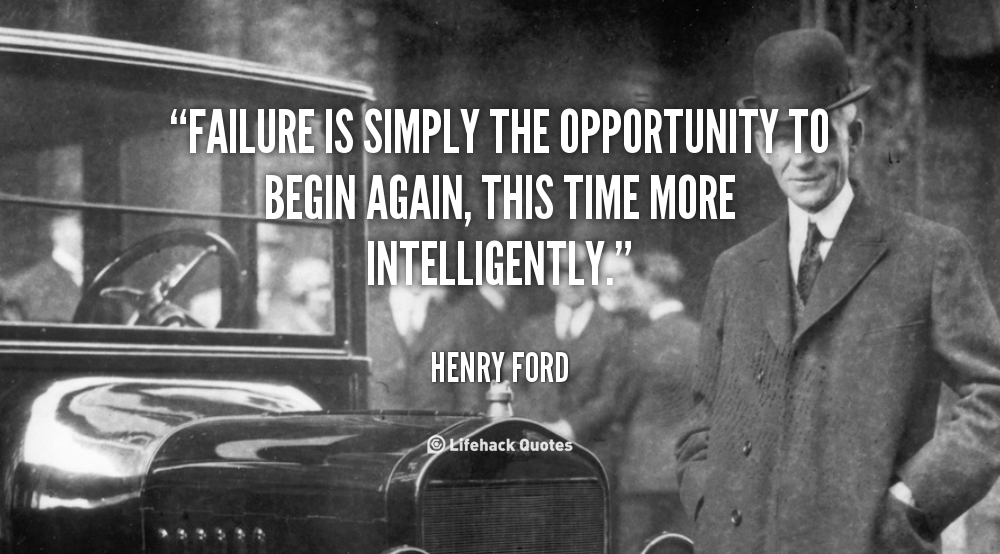
“Failure is simply the opportunity to begin again, this time more intelligently.”
There is a story, it’s unconfirmed whether it actually happened, yet the message within is none the less true:
Thomas Edison inventing the lightbulb was the result of several hundred failed attempts. In an interview, he was asked “How do you feel after all of your failed attempts?”
His response was great, “I didn’t fail, I learned hundreds of ways not to invent the lightbulb”
He saw each “failure” as a lesson. From that lesson he learned what won’t work, and also might work instead.
Each failed attempt, each rejection, were key steps on his path to success. It is easy to feel like you should give up after a failure. But perhaps in that failure is a lesson.
Pay attention to your failures, study them. Perhaps then you’ll learn how to succeed.
If you find it difficult to fight your fear of failure, here’s a guide for you: Why You Have the Fear of Failure (And How to Conquer It Step-By-Step)
5. Have an Unwavering Resolution to Succeed
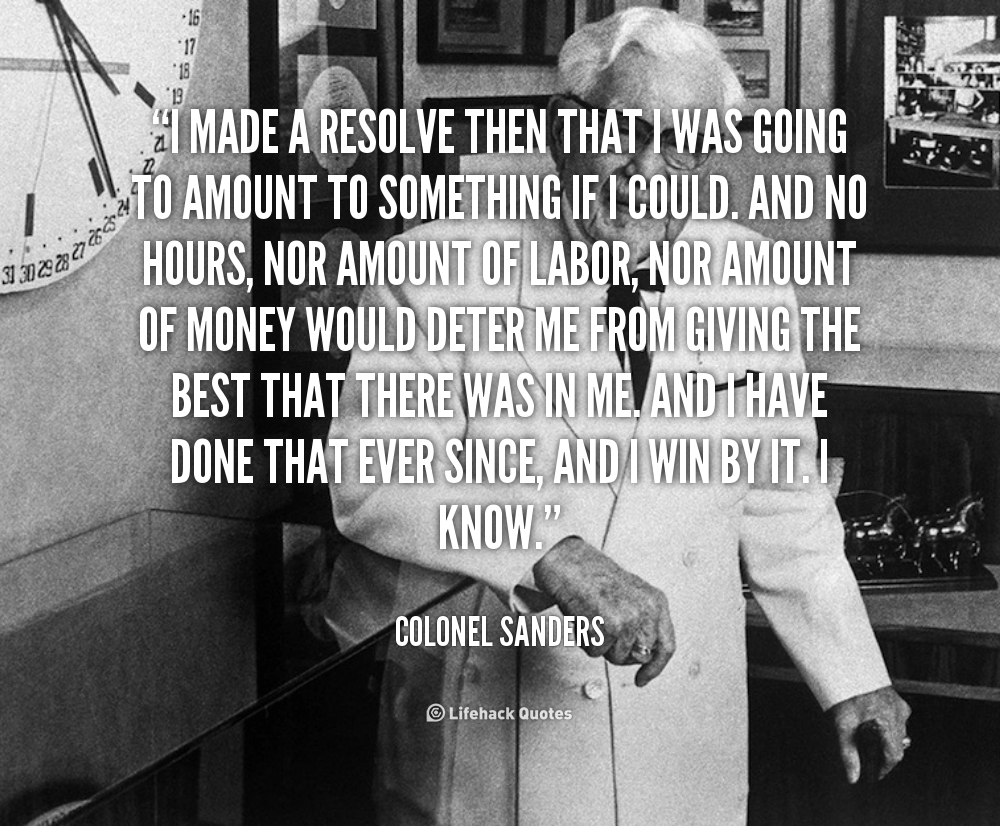
“I made a resolve then that I was going to amount to something if I could. And no hours, nor amount of labor, nor amount of money would deter me from giving the best that there was in me. And I have done that ever since, and I win by it. I know.”
This, in many ways relates to the above quote about learning from your failures.
It’s the easiest thing in the world to give up from a failure. The only way to push on is if you have the true burning desire to succeed, to not be moved or dissuaded from your goals.
If you are not truly dedicated towards success, then each failure will hurt more, each set back will slow you down.
Success is hard; without the unwavering desire to succeed, this difficulty may seem insurmountable. With the desire, it is merely an obstacle to go through.
6. Be a Person of Action
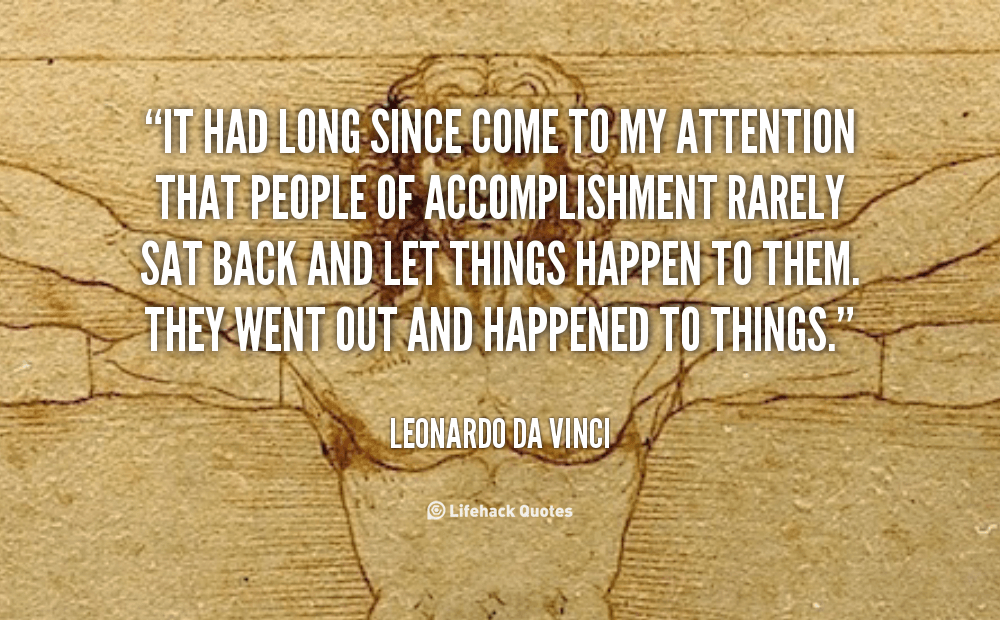
“It had long since come to my attention that people of accomplishment rarely sat back and let things happen to them. They went out and happened to things.”
Though it was said hundreds of years ago, it works just as much today as it ever had. It applies to literally any successful person.
Think about it, picture someone like William Shakespeare:
When we think of the time he lived in, we think of the time in a way shaped by him. When we think of Renaissance era Italy, we think of Michelangelo and Leonardo Da Vinci. Or think about the present day, Bill Gates or Steve Jobs. Our current way of life would simply be incomparably different if they didn’t accomplish what they did.
You’re probably reading this article on a device by a company that they either founded or companies influenced by them.
All these figures were proactive, they saw ways to do things differently and did them. If they let the world shape them, then they’d simply fit into the background. Instead they shaped the world.
Applying this to you?
Don’t be afraid of going outside the norm. If you can think of a better way to do something, do it that way. If you fail, try again.
7. Cultivate Positive Relationships
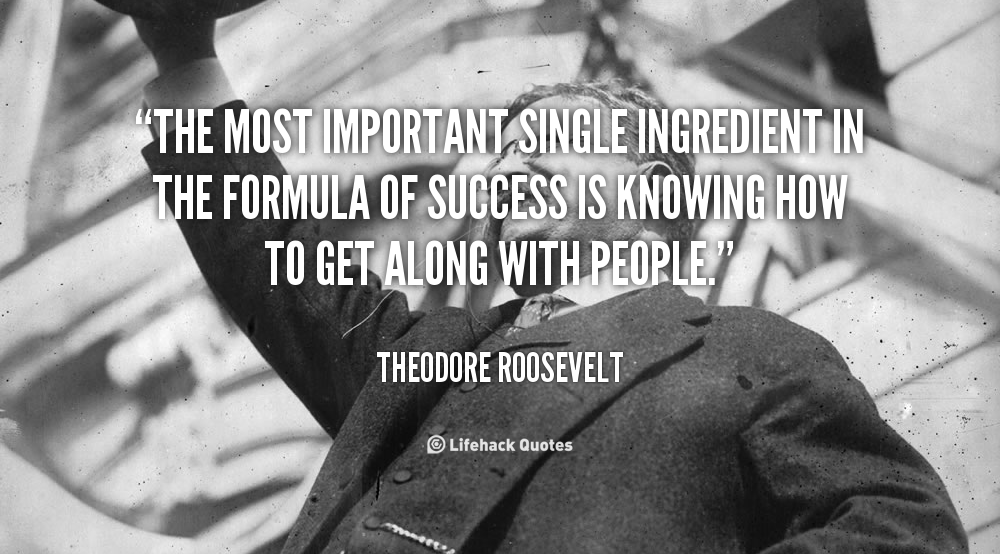
The most important single ingredient in the formula of success is knowing how to get along with people.”
The best leaders and some of the most influential people (and Theodore Roosevelt is one of the best leaders and one of the most influential people to have lived) were not those who caused commotions, who fought with people or disregarded people; but were people who were friendly to those around them.
People liked them. They wanted them to do well.
This is key to good leadership.
It’s logical. If someone likes you, they want to help you; if you give them a suggestion, they’ll gladly follow through with it.
But if someone doesn’t like you, they may either refuse to help or actively get in your way.
What’s more, it’s always a good idea to cultivate good relationships. You can never tell who will prove to become someone who’ll be able to help you in a big way, or even be a good and supportive friend.
As such, help people and they may help you; and be good to people, and they my be good to you.
8. Don’t Be Afraid of Introducing New Ideas
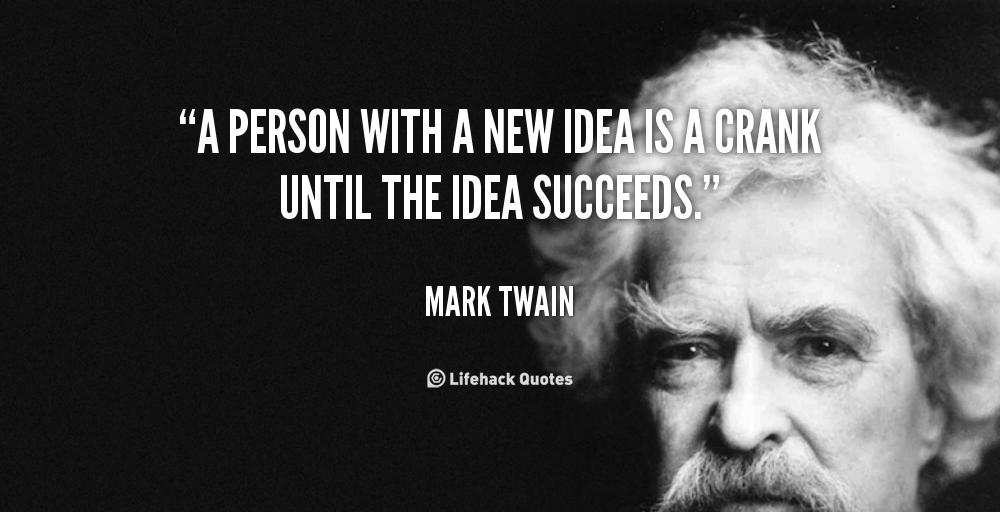
“A person with a new idea is a crank until the idea succeeds.”
It is an unfortunate truth that those with the boldest ideas are often disregarded.
Most of us are taught from an early age to think and do things similarly to everyone else. This can be great to fill an existing role. But to truly do things differently (and all successful people did things differently), you need to think differently.
If you have a new idea, don’t throw it away because it’s new and different; instead, celebrate it. Your strange new idea might one day be the one that leads you to success.
9. Believe in Your Capacity to Succeed

“If you can dream it, you can do it.”
Success has to be something you can imagine yourself achieving.
It is possible that you will come across those who doubt you and your ability to succeed. You must not become one of these people because the moment you cease believing and dreaming is the moment these dreams fall away.
Keep dreaming!
10. Always Maintain a Positive Mental Attitude
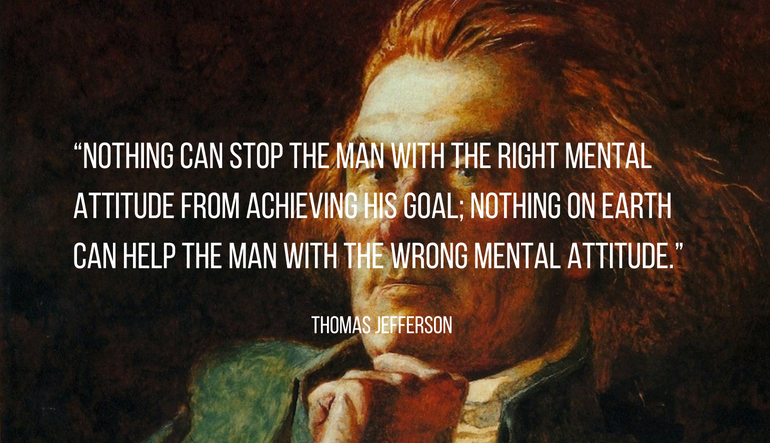
“Nothing can stop the man with the right mental attitude from achieving his goal; nothing on earth can help the man with the wrong mental attitude.”
Like the above quote says, you need to trust in your ability to succeed. This is the only way to cultivate the right mindset.
Replace negative thoughts with the positive ones. You need to approach problems, not as obstacles stopping you, but merely tasks that need to be completed for you to keep going.
If you stay positive and think like this, setbacks won’t affect you so much, people’s doubts won’t impact you and even the biggest obstacles will seem like minor problems.
However with the wrong mindset of doubt, you’ll be much easier to stop.
11. Don’t Let Discouragement Stop You from Pressing On

“Let no feeling of discouragement prey upon you, and in the end you are sure to succeed.”
It is an unfortunate fact of human nature — all of us in some way, doubt ourselves. This can be made far worse if others doubt us too.
When surrounded by doubts, giving up can actually seem like a good idea.
Don’t pay attention to the doubts. If you are discouraged, ignore it.
If this discouragement moves into your mind and you begin to doubt yourself. It is important to ignore this too.
12. Be Willing to Work Hard
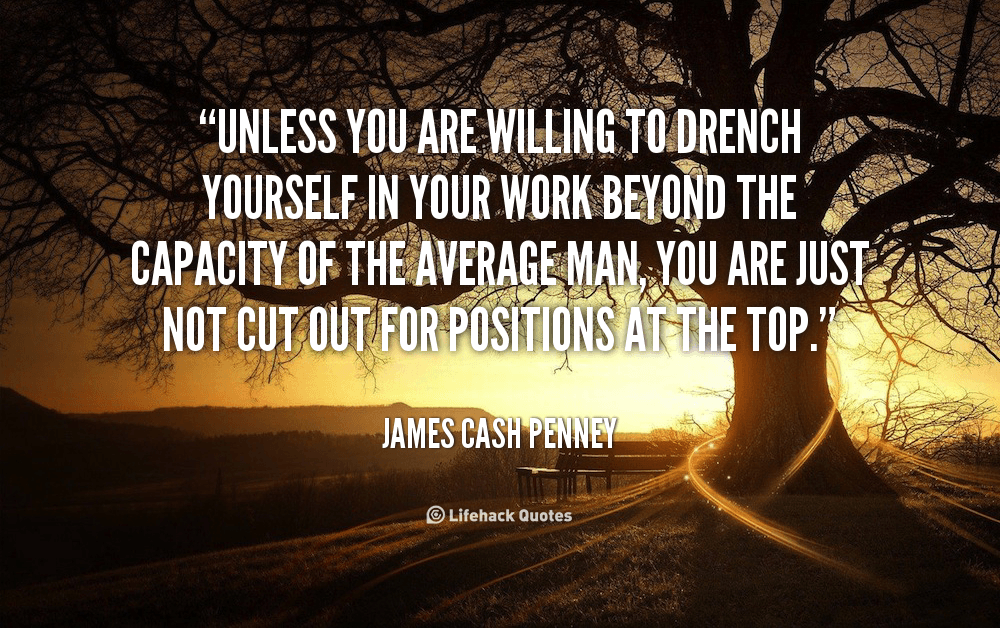
“Unless you are willing to drench yourself in your work beyond the capacity of the average man, you are just not cut out for positions at the top.”
You might have heard the quote that “success is 1% inspiration, 99% perspiration” or you may have heard about the 10,000 hours idea.
Whichever way you frame it, they say one thing:
True success comes from work.
You’ll never become successful if you don’t work towards your goal in life and keep working towards it.
Check out this article and you’ll understand Why Hard Work Beats Talent.
13. Be Brave Enough to Follow Your Intuition
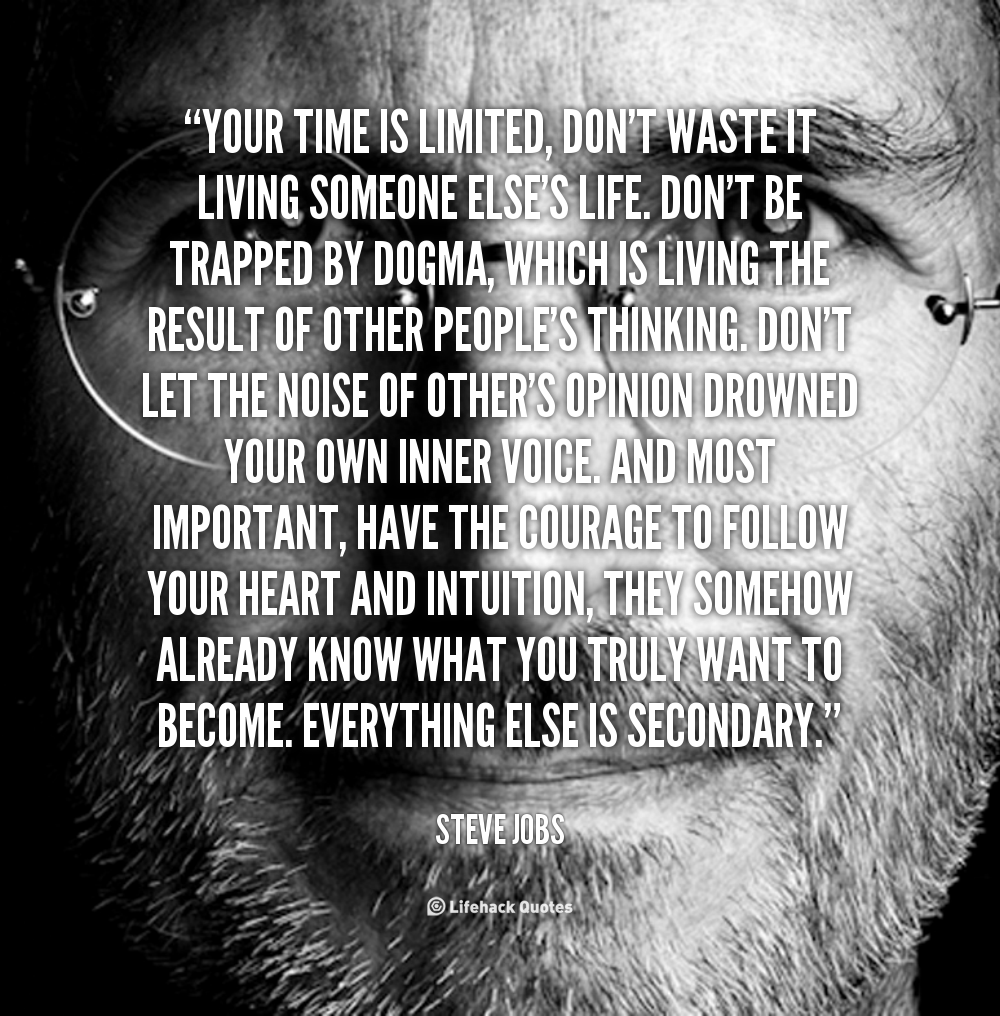
“Have the courage to follow your heart and intuition. They somehow already know what you truly want to become. Everything else is secondary.”
In ancient Greece, there was a group of Oracles who lived in Delphi. Everyone who needed advice or to know their future visited them, from the poorest of society to kings. Above the doorway of the temple were the words “know thyself”.
If you strongly believe and desire something, chances are that you already have an idea how to get there. If not, you may naturally know what things will help you and what things will slow you down.
It’s like how your body can detect danger even when things seem safe.
Ultimately then, you need to trust your own instincts.
Final Thoughts
What you might have noticed is that many of the above lessons are similar — most are about developing the right state of mind. This clearly suggests that the key to achieving success, in whatever you wish, comes down to the way you approach it mentally.
Moreover, no matter what stage of life you’re at now, you can still make a difference and pursue success. You can make resetting your life possible when you do this: How to Start Over and Reboot Your Life When It Seems Too Late
How to Live up to Your Full Potential and Succeed in Life
Have you ever heard the phrase “He had so much potential, it’s a shame he wasted it.” In our culture, not living up to your full potential is frowned upon, but why?
In this article, we will look into the factors that influence a person’s potential and the ways to help you live up to your full potential for a successful life.
What Determines a Person’s Potential?
A person’s potential is determined by several factors: Physical Security, Emotional Security, Environment and Mindset.
Physical Security
Before we can even strive to fulfill our potential, our basic physical needs must be met. Without adequate food, water and shelter, our days must be spent acquiring these basic needs in order to survive.
You can think of it this way, the person with the potential to become the most brilliant computer programmer ever could be living right now with a nomadic tribe in sub-Saharan Africa. But because they must spend their days meeting these basic physical needs, that potential will remain untapped.
Emotional Security
Humans are social animals, we don’t do well in isolation. Studies have shown that forming intimate bonds with others is incredibly important for our mental health. These bonds start to develop in infancy, babies rely on this bond with a parent or caretaker to fulfill their needs, and if the bond is missing for some reason it can have lifelong psychological consequences.
Environment
Your environment is another important factor that shapes how you achieve your full potential.
Just like the computer programmer in the previous example. You could have the potential to be the greatest composer since Beethoven, but if you had no access to music or you came from a family that didn’t value that skill set, it’s unlikely that you would fulfill your potential in that area.
Mindset
For most of us, we don’t have to worry about getting enough food, water or shelter. Both our physical and emotional needs have been met (to a large extent anyway). And any limits that our environment has imposed are minimal (especially with the availability of the internet).
So for most of us, the main thing that is limiting us from reaching our full potential is our mindset. Our mindset is the story we carry around with us in our head. It starts to develop in childhood and can be with us our entire life.

The Key to Reaching Your Full Potential: Your Mindset
The problem with most people’s mindset is that it’s negative and limiting. The good news is that you can change your mindset. Author Carol Dweck in her best selling book Mindset: The New Psychology of Success points out that there are two types of mindsets: fixed and growth.
A Fixed Mindset
A fixed mindset is one where you have concrete beliefs about yourself. Someone with a fixed mindset came up with “their story” in childhood and it hasn’t changes much over the years. They may believe that they aren’t good at public speaking, math or writing just because they struggled with those subjects in school.
So when something goes wrong, a common thought for someone with a fixed mindset is “What an idiot, I knew I wasn’t any good at that.” Or “Well that just confirmed what I already knew, I won’t be doing that again”. Having a fixed mindset just reinforces negative thoughts and attitudes, making it harder to reach your full potential.
A Growth Mindset
A growth mindset, on the other hand, is exactly the opposite. With a growth mindset, you believe anything is possible (but don’t confuse this with being delusional! As a 5’10” 54 year old I’m not going to play in the NBA!). It’s more of the way you think about and approach problems.
Let’s go back to the issue of not being good at public speaking, when things go wrong, instead of telling yourself that you have never been good at public speaking and never will be. A person with a growth mindset will analyze what went wrong and come up with solutions to make it better next time.
For instance, they may take a class on public speaking at their local community college, or join the Toastmaster’s organization. Whatever it is, they don’t look at failure as an insurmountable roadblock, rather a minor detour on the road to their destination.
You can learn more about how to develop a growth mindset in this article: 5 Ways to Cultivate a Growth Mindset for Self Improvement
How to Live up to Your Full Potential and Succeed in Life
1. Develop a Goal
When setting goals, it’s important to keep in mind three things:
First, they should be specific and not vague. So instead of saying “I want to live up to my full potential in life”, a more specific goal would be “I want to become the best (salesman, artist, internet marketer) that I can be.” This is a much more specific goal.
Second, your goal should be measurable. In other words, you should be able to measure your progress towards the goal. Again, it’s much easier to measure your progress to becoming the best artist you can be than it is trying to measure your progress at living up to your “full potential”.
Finally, a goal must be written down. This takes the goal out of the realm of wishful thinking and makes it more real. It also can serve as motivation if you post your goal where you will see it. Put it on your desk, or next to your computer just to remind yourself to keep moving forward. In short, a goal that isn’t written down is just a wish.
This article can help you about setting personal goals to become a great achiever: How to Use SMART Goal to Become Highly Successful in Life
2. Understand That Achieving Your Goal Is Often Times a By-Product of What You Are Doing
Let’s say that your goal is to become the best writer you can be. You may want to measure your success by your ability to get published or in the case of blogging, how widely read your articles are.
Instead of constantly worrying about reaching your goal to be the best, your time is much better spent just writing. As with anything, the more you do it, the better you’ll get.
It’s the same with any goal, it’s important to set them, but achieving your goal of becoming the best salesperson is really just the by-product of you getting out there and selling!
3. Don’t Let Popular Opinion Dissuade You
Have you ever heard of the Bannister Effect? For years, it was considered a law of nature that the human body was incapable of running a mile in less than 4 minutes. That was until May 6, 1954 when Roger Bannister ran a mile in 3 minutes 59.4 seconds. He did what was long considered impossible, but it turned out that it was only impossible because people believed it was impossible.
Roger Bannister didn’t let popular opinion stand in his way, and after he proved that the 4 minute mile was only a psychological barrier, others have continued to break records. Today the current record holder is Hicham El Guerrouj with a time of 3 minutes 43.13 seconds!
4. Don’t Be Afraid to Push the Envelope
Almost by definition, living up to your full potential requires you to step outside your comfort zone and expand your boundaries.
Average people do average things, get average results and live average lives. Extraordinary people do extraordinary things, get extraordinary results and live extraordinary lives.
You’ll only live your best life once you step out. Here’s how.
5. Practice Discipline
Admittedly, this comes easier for some people than others, but it’s a skill that you can develop and will serve you well in all aspects of your life.
Another way of thinking about discipline is just delayed gratification. How many times have you been on a diet, but there’s a piece of cheese cake in the refrigerator calling out your name!
Having discipline is not a matter of not wanting the cheese cake, discipline is acknowledging your desire for the cheese cake but realizing that this craving is only temporary, and once it passes, you will be much happier that we didn’t succumb to a temporary urge.
The bottom line here is that while you may want to stop working at 5pm sharp, or watch the game on Saturday, but by developing the discipline to delay satisfaction you will be pushing your boundaries and reaping the rewards that come from that extra effort.
6. Be Confident
Have you ever dealt with someone who was new at their job and lacked confidence? Maybe it was a salesperson who couldn’t answer basic questions about a product or just gave you flat out wrong information. Did you end up buying from that salesperson?
My guess is no, I sure wouldn’t.
Confidence comes with knowledge, discipline and experience. But how do you develop confidence if you are just starting out like our intrepid salesperson? While experience comes with time, knowledge can be acquired fairly quickly, especially if you have already mastered the art of self discipline!
A good rule of thumb is to always start with knowledge. Learn as much as you can, take classes, get a mentor or just do research. If you are disciplined enough to develop the knowledge it will make getting the experience much easier.
Want more tips on boosting confidence? Take a look at this guide: How to Be More Confident: 10 Powerful Ways to Boost Confidence
7. Accept That You Will Fail
There is no such thing as an overnight success. Failure is a part of life and it happens to everyone. In fact, there is a whole body of thinking that failure is actually better than success: 6 Reasons It’s Okay To Fail
While most of us would agree that success is better than failure, when it does happen, here are some thing to keep in mind:
Don’t take it personally. A failure in a job, career, business or marriage is just that. It is not reflection on you as a person. I had a friend who lost his entire fortune (over 20 million dollars) in a business deal. I called him shortly after and as expected he was very depressed. My only advice to him was to:
“Never confuse your self worth with your net worth”.
Move on, failures can be heartbreaking, embarrassing and demoralizing. Take the time needed to go through those feelings and process the emotions. Then, let it go, holding on to negative emotions keeps you stuck in a fixed mindset. Remember that your goal here is to live up to your full potential and succeed in life. Dwelling on past mistakes and failures is the surest way to derail your progress.
Let failure be a learning opportunity. I know it’s a cliche, but it’s a cliche for a reason, it’s true! When I first started internet marketing, I started using Facebook ads for practically everything I did. Pretty soon I found that I was spending about $1,000 on ads that were generating about $200 in income, not a very good business model! I took that failure and redesigned my marketing efforts. I was able to both reduced my costs and increased my sales so that now for every $1,000 in advertising I am generating around $5,000 in income.
8. Learn to Embrace Uncomfortable Situations
Succeeding in life by living up to your full potential means embracing uncomfortable situations. Chris and Heidi Powell, well known personal trainers and hosts of the show Extreme Weight Loss use this technique with their clients. It works like this:
They set a goal for their client that the client thinks is just out of reach. Then through encouragement and motivation, they help the client work though the uncomfortableness and pain to achieve the goal.
This technique works for both physical and psychological challenges. Both our bodies and minds are capable of much more that we think they are.
9. Set Small Goals to Achieve Big Results
When you are first setting goals, don’t be afraid to make them big! “I want to be the #1 salesperson in the company” or “I want to be a successful artist”. But once you have those goals set, you then need an action plan to get there. It’s in this action plan that you should set many small, easily attainable goals.
For the salesperson, it might be to increase the number of sales they make by one a week in the next quarter, two a week for the 2nd quarter etc… For the artist, it might be to master a technique before the next art show, or produce X number of works to sell at the art show.
Whatever the goals are, they need to get you closer to your ultimate goal while at the same time be attainable. Success builds on success, so achieving these small goals helps to motivate you to continue on to your bigger goals.
10. Take Time to Recharge
Everyone needs “down time”, trying to do everything yourself, all at once is a recipe for disaster.
We talked a lot about being motivated and disciplined in this article; while they are essential to living up to your full potential and succeeding in life, having adequate down time is just as important.
Any personal trainer will tell you that to get the most out of your workouts, you need to take 1 to 2 days off a week. This gives your body a chance to recover and actually get stronger.
The same is true when we are trying to expand our boundaries and fulfill our potential. Making sure we have adequate down time prevents fatigue anxiety and poor decision making.

Final Thoughts
The success you’ll find from living life to your full potential is its own reward. One day, we all will look back on our lives and and think “I wish I would have done …”, “I had a chance to to be a … but I was to scared”, “I could have been a great … if I had put the time in.”
I hope that in this article, we have given you both the motivation and tools to push yourself to your full potential in life, so that when you look back one day your regrets will be few.
How to Create Your Road Map to Success (A Step-By-Step Guide)
Everyone has their own definition of what success means to them. Well, at least we all should by the very fact that no two individuals are created 100% alike.
Our road map to success should be different to the person standing next to us. But we can get caught in the dangerous trap that someone else’s ideas of success should also be ours. Be careful.
Regardless of whether or not we’re talking about your working career, business or personal life, it is truly hard to resist the contagious excitement surrounding those fantastic dreams and goals you allow yourself to explore.
The ‘come-down’ after attending a euphoric state-inducing personal development seminar can often result in you feeling the slump of post-seminar blues. Worse still, your everyday circumstances don’t accommodate the changes you swore to make that weekend. Nothing changes.
Get ready to kiss goodbye the post-seminar blues and skip to each destination on your roadmap to your successes. By repeating over and over these simple steps, the quality of your life will improve.
You will want to use these steps as standard strategies to carry you toward further success in whatever shape or form you choose.
1. Define What Success Means to You
Is it just having enough money or more money than you might ever need that allows you to feel and judge yourself a success? Is it about having a beautiful house worth more than $2,000,000 on the upper east side of Manhattan?
Is it about having a loving partner who supports you in your endeavors? Do you equally support each other?
Is it through the tertiary education roadmap that you only feel valid you can make a meaningful and successful contribution to help the world economy turn? Is that your definition of success or is it someone else’s? Maybe your mom’s or your dad’s?
When her daughter Christina found her on the floor of her office, in a pool of blood having hit her head and breaking her cheekbone as she fell, CEO of Thrive Global and celebrated author of Thrive, Ariana Huffington had a wake-up call in more ways than one.[1]
The exhaustion and overwhelming stress which had led to her fainting drove Huffington to radically introduce new work ethics, values and rules at the editorial.
Ten years on from her accident, Huffington still leads the conversational charge amongst global leaders to change the badge of honor that successful people need to work 24/7, and give everything of themselves and more, even it means compromising their health.
As opposed to letting power and money be the two measurements of success, she explains wisdom, well-being, wonder and giving will give you greater success by nurturing your psychological well-being.
We can’t argue with Huffington that without that, we are proverbially dead in the water.
Warren Buffet stated the way he defines success nowadays has nothing to do with money:
“I measure success by how many people love me”.
You can’t but fall in love with the wisdom and nobility these words seem to reflect, but keeping it as your only definition of success is probably dangerous. Lacking today’s wisdom at 20 years of age, would Buffet have had the same definition of success?
Think about where you are on your journey. You are likely to have different goals and different measures of success as you navigate your roadmap. Huffington and Buffet explain non-tangible ideas of success are crucial for our overall success.
Let’s also not forget though that through tenacity, persistence and many other success habits, these business leaders also rate extremely high on the power and money metrics. However, that’s not all there is to it.
If you are not sure how you would answer if someone asked you what your definition of success is, here are some clues to get you thinking and feeling.
As your head hits the pillow and before you close your eyes, what’s most important is that you can internalize that you have chosen your definition of success and you can full responsibility and accountability for deciding upon it.
2. Review Your Progress and Satisfaction in Life
Review the main areas of your life. Not just those where you feel you need to make changes. Review all of them:
- Your career vocation or business life;
- Your relationships – your intimate or life partner, family and friends;
- Money health and financial management strategies;
- Commitment to your faith or religion and spiritual personal development;
- Your physical and mental health;
What leisure or recreational activities you pursue for fun to energize your spirit and enrich your soul.
Do you have ideas of what success looks like for you in each of these areas?
Neglecting to look at even one area is like trying to restore function to a beautifully crafted Swiss watch, whilst failing to attend to a rusty-looking cog in the tiny internal workings that needs attention. Turn one cog, the others all turn. Ignore a damaged one, the system malfunctions.
For each area, give yourself a rating out of ten – one signifies the least satisfaction and ten signifies the most – and ask yourself the following questions to help you start identifying what’s important to you:
- How satisfied or content with this area of my life am I presently?
- Where would I like to live this current level of contentment to?
- What would that new level of satisfaction look like, feel like?
- How important is this area compared with the other areas of my life?
Regardless of what areas you recognize need to be your core focus, consider making personal development and improvements to your physical and mental health, and well-being a constant feature of your action plan.
You will need to continually recognize obstacles you’ll face from your outside world, as well as those internal psychological battles that will arise from within.
Without your mental and physical health intact, it’s unlikely the rest of the ‘cogs’ are going to turn properly.
3. Get to Know Your Values and Priorities
Don’t make the mistake of thinking goal setting can be done in one sitting. You want to make sure the pursuits you put down on paper aren’t fly-by-night moments of excitement that ebb and flow with the rise and fall of tidal trends.
Become better at identifying your priorities by exploring how you feel about each of your life areas. Think about the ratings of satisfaction you might have denoted for each. And now write down what you want to be, do and have.
Put aside your initial literary ramblings and revisit them in a couple of weeks or one month. Without looking at your initial thoughts, do the process again and see what consistencies show up. What keeps coming up as feeling important? Around what ideas is there the same yearning or emotional pull?
If you’re unsure about what you feel you wish to head towards, be in allowance of this. Don’t be jumping to quickly fill the void. The desperation is likely to have you catching the tail of the last exciting concept in fear of missing out, or trying to fill the void of excitement you yearn for.
Increase your practice of pausing and asking yourself:
Why does this resonate with me? Could this be a distraction which complicates the route I have mapped out? Am I becoming that person who proverbially chases two rabbits and catches none?
In his book The Heart of Love, Dr. John Demartini explains how becoming strongly aware of your values and priorities helps you understand why you are and where you are in your life at any given moment.
If you don’t know what you feel you stand for, look at where you direct your time, energy and attention. Look at your behavior and work backward.
You might think making money and creating financial wealth is high on your radar. However, if you spend more than you earn and allocate money to depreciating objects as opposed to appreciating assets, your behavior is inconsistent with those typical of someone who is financially astute.
Look back to your areas of life and ask yourself if the goals you have set are in alignment with your values. Look at your daily behaviors and ask yourself if the way you operate satisfies steps which take you further toward those goals.
If not, all is not lost. You’ve simply got some harsh truths and reality checks to face before you can go any further on your roadmap to success.
4. Make Room Deliberately to Work with a Coach
You have to come to terms with the fact that you’re likely to be swimming against the tide.
Once you make clear unwavering decisions about what goals you’re aiming for, prepare to be un-liked, unpopular, criticized and potentially ostracized. There’s a high possibility you’ll lose the friendship and support of some however you will gain new friends and the support of others.
Regardless of what area/s of life your goals pertain to, make room to work with a coach. Choose wisely who that person will be to encourage and walk beside you.
Whether it be a certified coach, a family friend/mentor or qualified therapist, find someone who knows how to work with the specific issues and challenges that lay ahead without any agenda other than your success.
Having that impartial guide can be an invaluable constant. This helps keeps you on the straight and narrow even if other areas of your life aren’t going swimmingly.
5. Get Highly Familiar with Your Habits and Behaviors
Despite the scientific evidence in support of it, we’re not recommending you need to start getting up at 5:00 am and exercising for an hour before you even think about starting your day.
You should start asking yourself these questions far more frequently:
- How well do you know your habits and routine ways of operating?
- Do you know what choices and patterned behaviors help or hinder you?
You know what you want to work on. Greater clarity on your values has enabled you to discern which priorities are high on your list and which ones are low. It’s now time to reinforce and reward the habits that carry you forward on your roadmap to success, and adjust those habits which delay or divert you staying on course.
Remember though that part of the joy of the human experience is to be fallible, so don’t suddenly shelve all those character-building ‘vices’. Your flaws are a necessary part of your unique success jigsaw puzzle; they are the inspiring reasons you’re going on this journey in the first place.
Demartini and New York Times journalist and author Charles Duhigg both explain in their books how recognizing your unhelpful behavioral patterns needs to take place first. You identify the emotional and psychological rewards which rule over whether you sustain, break or make a habit.
When you know the rewards that light you up like a Christmas tree, you link them to new or modified habits that support values you want to make a higher priority.
Say you love eating out. You love artisan cuisine and get giddy at watching the episode of Heston Blumenthal create chocolate water in his food chemistry laboratory. As much as you say you want to increase your investment in appreciating assets, your spending habits speak otherwise.
So, you might start looking for discount opportunities on your higher-end dining. The dishes may not rival Heston’s masterpieces, but your taste buds still enjoy a culinary roller coaster AND you also now to get feel-good allocating the discounted amount to a saving’s program.
Your tummy is singing as is your bank account. The whole experience goes well beyond short-term gratification and satisfies several values and goals.
Tweaking habits and forming new ones isn’t hard; it’s just a matter of finding a happy marriage. Take time to find it. There will always be ways.
6. Celebrate the Wins and Monitor Your Progress Along the Way
You must become good at deliberately rewarding yourself when you make changes that take you further along your roadmap to success.
Professor of cognitive neuroscience Dr. Tali Sharot explains how the brain responds and adapts far better to rewards than punishment when it comes to learning behavior and creating new habits.[2]
When we apply punishment, we reinforce the traumatic memory as being more important than the actual lesson we might have been meant to learn in the first place.
When we gamify rewards on our success journey, we inject fun and humor. We also reduce the stress that often comes with learning new things, habits and adjusting to new ways of being, doing and having.
Final Thoughts
If you hit a progress plateau at any point, you might need to allow yourself to plateau and switch your attention to another priority.
The switch may allow you to think more freely and clearly about how to move past your roadblock. Or it might simply be a good time to stop and smell the roses.
Your muscles grow stronger in their resting phase after a workout. Animals hunt profusely to build up their energy stores before going into hibernation.
Remember that continually forging ahead is not a natural rhythm. Repeat the cycle of rest, recovery and rallying forward then…start again.
What Holds Us Back from Living the Life We Want
Parents, caregivers, teachers and society in general all have a huge influence on how we live our lives.
That’s why people traveling to other countries often experience ‘culture shock’. The different rules, different customs and different attitudes can quickly lead to a feeling of confusion and alienation.
You may have experienced this yourself.
But, culture shock really just shows how conditioned we are by our local customs and culture. This is something you may not have considered before. But, I would urge you to do so.
It’s possible that you’re living the life that your parents, teachers and society want you to live — rather than the life you’d love to live.
Ready to break free from this conditioning?
If you are, then you’ve come to the right place, as I’m going to share with you five strategies that will allow you to escape your mental prison.
Let’s look first at…
The Benefits of a Confident Attitude
Generosity and a humble attitude are wonderful traits to have — yet, being humble can actually hinder you from reaching your goals.
If, when working in a team, you take on tasks behind the scenes, your work may go unnoticed. Which means you won’t actually get the credit you deserve.
It’s a sad fact of life, but if your efforts aren’t recognized, you’ll be forgotten about when opportunities arise.
And, if you often play the role of “I’m not good enough to do XYZ” — then please stop!
Starting right now, if you change your attitude about your own abilities and focus on your strengths and improving on (or delegating out) your weaknesses, then you’ll massively boost your confidence, which will translate into achieving your goals.
So be sure to speak up about what you’ve accomplished. I guarantee your confident attitude will work wonders for you!
Say Goodbye to Limitations
Do you often go through life thinking you’re not smart enough or not disciplined enough? And, how about time? Do you frequently feel that you don’t have enough of it?
I certainly used to feel that way.
Fortunately, over the years, I’ve been able to discover and put into action dynamic techniques that have allowed me to break free from my limitations.
Positive self-talk is an example of one of these techniques. This is a simple, but powerful, tool for stepping outside of your conditioned and habitual thought patterns.
What exactly is self-talk?
It’s the words you externally and internally tell yourself day in, day out.
“I’m not good enough to do this,” you might tell yourself over and over again. Well, guess what? With that attitude permeating your mindset — you probably won’t be good enough.
But, just as negative thoughts can lead to negative results, positive thoughts can lead to positive results. Using the example above, change the wording to “I’m good enough to do this,” and watch your positive self-talk boost your confidence and give you the strength and courage to say goodbye to your limitations.
You might also want to practice tried-and-tested ways of elevating your self-belief. Stuff like: always finding time to learn new things, focused goal setting and effective time management.
Do You Fear Change?
You’d love to make that big career change, but you’re afraid that it’ll end in failure.
You’d love to ask out that special person on a date, but you fear they’ll say no.
You’d love to move to the coast, but you’re scared to leave behind your habitual environment.
Sound familiar?
I’m guessing it does, as fear of change is probably the most common thing that prevents people from reaching their potential and doing the things they’d love to do.
The secret to defeating fear of change is to understand that if we want to change our lives for the better — we need to make changes in our lives. Without changes, nothing changes. It’s that simple.
In reality, fear of change is really just fear of the unknown. Now, I realize the unknown can be a scary place. But, it doesn’t have to be.
Again, it comes down to our attitude and perspective. If we approach the unknown with excited anticipation — we’ll no longer be afraid of it. And, its power over us will be gone forever.
With that simple change of mindset, you can put your fears in the past, and start living a life that embraces and welcomes change and opportunity; an authentic and free life.
Paint a Picture in Your Mind
Did you know that the majority of us think in pictures? That’s right. While we may speak and write in words, our brain turns these things into pictures.
Just think back to some of your most important memories (perhaps your first kiss, your graduation day, or the birth of your first child). Do words and sentences come to mind? Likely not. Instead, you may immediately bring back vivid images of the events. And, not just still images, but moving pictures that are equivalent to videos.
Once you understand that the mind functions with pictures, then the key to changing your mind — and your life — is to change the pictures that you put into your mind about the future.
For instance, if you constantly picture yourself stuck in the same job, then… you’ll probably end up doing just that! But, if you make a concerted and persistent effort to picture yourself in a new, stimulating role — then that’s where you’re most likely to end up.
You may know this technique as ‘visualization’. And, along with the other techniques I’m sharing with you in this article, it’s a powerful piece of the success puzzle.
So start right now by building a clear, definite picture of where you’d like to be in 12 months. Once you have the picture, then use daily repetition to place it firmly into your subconscious mind (expect this to take at least 30 days).
Do this, and watch your mental images gradually turn into reality. I like to call this real magic.
Your Setbacks and Obstacles Can Be Opportunities
Pause for a moment, and think about the last few days. I guarantee that along with the good stuff, there’ll be several times when you’ve had to face setbacks and obstacles. Things like: being stuck in traffic, a missed deadline at work, a health challenge, a relationship issue, and an unexpected bill landing in your letterbox.
This is perfectly normal. We all go through similar things to these on a regular basis. But, the difference between winners and losers in life, is that losers are defeated by these setbacks, while winners are propelled forward by them.
Let me explain with a quick example.
You’re on your way to an interview for an important job–a job you’ve always wanted. You allow plenty of time for walking to the train station, taking the train three stops, and then catching a cab to the office where the interview is scheduled to take place.
Your walk goes fine, but when you get to the station, you discover something shocking — all the trains have been canceled!
You could choose to panic at this time, and perhaps call the company to cancel or delay the interview. Or you could think creatively…
The job is what you’ve always wanted to do, so you don’t want to miss the interview or allow the company to see you in a negative light. You think for a few moments and then decide upon a strategy — you’ll pay the hefty fare for a cab to take you all the way.
The taxi driver is chatty, and he asks you what’s the purpose of your visit. You tell him about your interview and he replies with something surprising: he’s a friend of one of the people who will be interviewing you. He goes on to talk about how nice they are and how you’ll get on really well with them. In fact, he puts you so at ease that you begin to feel like you’re already part of the team!
You arrive early for the interview, and with the unexpected but welcome support from your taxi driver friend, the interview goes super-smoothly. And, a few days later you’re thrilled to receive a call asking when you can start.
Did the taxi driver put in a good word for you? Perhaps. As that’s the sort of thing that happens when you refuse to bow down to setbacks and obstacles.
I hope the self-improvement techniques I’ve outlined in this article will help you to begin breaking free from your limitations — and to begin breaking out of your mental prison!
Build your confidence.
Embrace change.
And, picture your success in all its glorious detail.
Take these steps now, and begin living the life you’ve always dreamed of.

Comments
Post a Comment